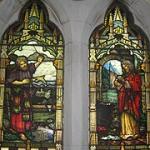
Gideon was a common farmer, basically ignored and filled with self-doubt; but an angel called him “a mighty man of valor.” With God’s guidance, he was one of those ordinary people who became a hero, freeing his nation from oppressive captivity (see Judges 6-7).
Blessed Ordinary People
Gideon’s “faith still inspires us today after more than three thousand years,” explained Elder Dieter F. Uchtdorf. He continued,
The Lord chooses the humble and meek—partly because they are humble and meek . . . These wonderful ordinary people accomplish great things not because of who they are but because of who God is!
As with Gideon, God can strengthen and increase the abilities He has already given those ordinary people. Elder Uchtdorf expanded his explanation, ” (Doctrine and Covenants, 64:34).
Many of us have, as I have, described ourselves in these ways: “Unworthy. Untalented. Nothing special”—Elder Uchtdorf’s words. He counseled us: “You say you’re not perfect? You’re not good enough? Well, welcome to the club! You may be just the person God is looking for.” If you have a mental health disability, you need professional help. If you are just one of us ordinaries, these ideas may help you.
Earthly Time in Humble Places
Joseph Smith, Brigham Young, John Taylor, and Wilfried Woodruff—like Gideon— were chosen in the eternities, but spent some of their earthly time among those ordinary people, struggling as Church founders and pioneers. Even the Savior of the World; his eternally chosen mother, Mary; and His earthly father and guide, Joseph, lived in humble circumstances in Nazareth. And many people we may recognize now as extremely influential didn’t necessarily start out that way.
Do all “successful,” “influential” people start out struggling or uneasy? Of course not. The Lord sends people where He wants and needs them. Many are born with the proverbial “silver spoon” in their mouths. Some of them are known to us; some are not. We cannot name all the silver-spoon persons one by one”—we’re not supposed to. But we have all benefited from what they have contributed, and are extremely grateful.
Moses wasn’t born with a silver spoon; his parents were slaves in Egypt. However, he received one in infancy when Pharoah’s daughter found him in his floating cradle and decided to adopt him as her son. He had the advantages of a royal child while his father was still laboring on Egyptian building projects. The Lord sends people where He knows they should be to do things He knows they will be doing.
Some of Those Ordinary Heroes
Those ordinary people who could do extraordinary things have lived at all times and in all places.
Ruth
One of my favorite ordinary heroes is Ruth, who started out perhaps a few notches below ordinary. Ruth came to Israel as a widow and a foreigner. Her mother-in-law, Naomi, an Israelite, had settled in Moab with her husband and two sons during a famine; all three of these men had died. When it was time for Naomi to return to Israel, one of her two daughters-in-law, Ruth, recognized how agonizing that return was going to be. Ruth chose to go with Naomi. Ruth’s words echo throughout our bible history.
Entreat me not to leave thee, or to return from following after thee: for whither thou goest, I will go; and where thou lodgest, I will lodge: thy people shall be my people, and thy God my God. (Ruth 1:16)
In those times, people with no food source were allowed to glean in grain fields. The law required landowners to pass up harvesting the outside edges of fields, so that persons who needed food could come and take those leftovers. If gleaning could feed Naomi and herself, Ruth would glean.
Ruth’s determination and faithfulness were noticed by Boaz, a wealthy landowner-kinsman, who made sure Ruth would “find” extra. He also manipulated law and customs to marry her. That ordinary gleaner’s descendants were kings.
More Recent Ones
Like Ruth, many ordinary people have immigrated to new countries and new cultures. Fritz Hjalmar Lundgren, one of those ordinary people, came to the U.S. from Sweden at age 19, carrying one suitcase, speaking no English, and having six years of “formal schooling.” He found employment in Oregon as a lumberjack and later joined the Church of Jesus Christ of Latter-Day Saints—his wife and daughter with him. He was never a bishop, but in his calling as home teacher he reactivated 50 families. A letter found among his papers revealed, “Brother Fritz’s secret, I believe, is that he is always on an errand for Heavenly Father.” Was Fritz a hero? Ask his granddaughter Michelle Craig or some descendants of those 50 families.
Some return home after disaster. Blinded from battle in World War II, Hyrum Shumway might have been considered an ordinary disabled veteran—by those who didn’t know him well. But when he proposed to the woman he planned to marry, he added these words: “If you will read the mail, sort the socks, and drive the car, I can do the rest.” She believed him, and they became the parents of eight children.
The Shumways lived in Wyoming, where he was State Director of Education for the Deaf and Blind for 32 years. He served people who needed him, and he also served the Lord as bishop and stake patriarch. Then after retirement, he and his wife became one of the senior couples of the London England South Mission. The Lord had important things for this family to do, and they did them (see Christopher Waddell, 2017).
“Whom the Lord calls, the Lord qualifies” and “When we are on the Lord’s errand, we are entitled to the Lord’s help.” Elder Carl B. Cook quoted these words of President Monson, and included his own addition: “Whether we are overwhelmed or underwhelmed, whether we are scared to death or bored to death, the Lord wants us to gear down, power up, and serve.”
As one of those ordinary people, I get the message. I don’t have the automotive skills to gear down or power up, but what the Lord calls me to do, I know I can do and must. The Lord knows who we are, where we are, what He wants us to do, and how He will help us do it. Watch out for us ordinaries—we may surprise you.













